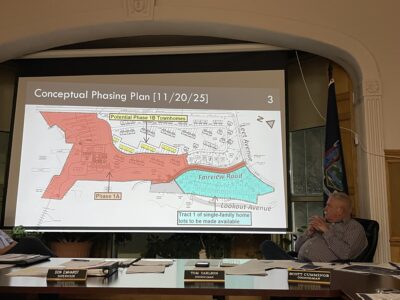Lawmaker Proposes Change To Landlord Credit Checks

Assemblywoman Michaelle Solages, D-Valley Stream, is pictured at the recent opening of new Long Island Rail Road track expansion.
A Long Island lawmaker wants to limit what can be considered a landlord’s credit check when considering new tenants.
Assemblywoman Michaelle Solages, D-Valley Stream, wants to prohibit landlords from refusing to rent or lease property to a potential tenant due to the tenant’s credit score or consumer credit history as long as the tenant can meet one of several conditions. Landlords found violating the law would face a civil judgement between $500 and $1,000.
“As New Yorkers continue to grapple with the effects of the COVID-19 pandemic, finding and maintaining affordable housing has been an a difficult challenge. A low credit score, possibly due to pandemic hardships is a barrier for many tenants to access new housing,” Solages wrote in her legislative justification.
Solages wrote the amount of renters falling behind on payments doubled between 2017 and 2021. In 2021, the amount renters with debt rose from 12% in May to 21% in June — a 9% increase within a month. She pointed to medical debt and credit card debt as problems for many renters, particularly for Black and Hispanic families.
A. 10676 would prohibit refusing a renter based on a credit check if a renter could prove they had made full rent payments within five days of the due date for a year before a rental application is submitted. Credit checks would also not be a reason to deny a renter if the renter’s rent is paid through a government subsidy given directly to the landlord, if the renter’s credit history shows delinquencies or collections due solely to medical or student loan debt, or if credit issues are the result of domestic violence, dating violence, sexual assault or stalking.
Landlords who would deny a renter based on their credit history or score would be required to notify the potential renter in writing and give the applying renter an opportunity to show meet one of the bill’s triggering conditions.
“With so many marginalized communities struggling to make ends meet during unprecedented times, a low credit score is not uncommon and not a clear indicator of the financial health of a potential tenant. Instead, credit checks that block potential tenants from access to housing, especially affordable housing, serve only as a barrier to a basic human right,” Solages wrote.
A similar bill had been proposed in California by Assemblywoman Sharon Quirk-Silva, D-Fullerton. That bill would have prohibited property owners from asking about anything that would be included in a report, such as payment history or evictions. The legislation was opposed by the California Apartment Association and was pulled from consideration earlier this year.
The association wrote that credit reports are used for home loans, car loans, bank loans, utility services, cell phone providers and credit card providers to qualify individuals for services or financing.
“Analyzing a credit report is not about determining whether a person is high income or low-income,” Debra Carlson, CAA state and public affairs and compliance executive vice president, wrote in a letter to Quirk-Silva. “It demonstrates how an individual has managed debt in the past. It demonstrates the level of risk the individual poses to a borrower or to a rental property owner. If an individual has a history of making on-time payments and managing debt responsibly, they will likely have good credit. A rental property owner must count on the rent money to pay their own mortgage, insurance, taxes, maintenance, and the like, and many small property owners count on the rental payments as part of their retirement income. You put these owners at risk with AB 2527. With the COVID-19 pandemic, it has been an extremely challenging past couple of years, and AB 2527 will serve as the final ‘straw’ for many owners to remove their rental units from the market.”



